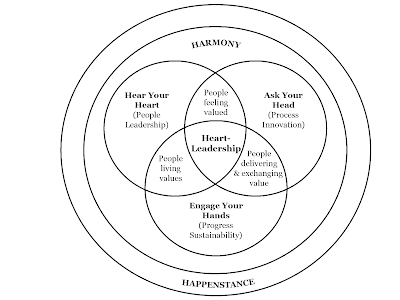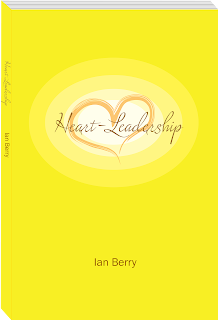Today’s podcast content is drawn from the epilogue of my Heart-Leadership book. The subject is Heart-Leadership practice.
Listen to the podcast version of this post
To sustain being in harmony with yourself, other people, and our planet, and then to consistently hear your heart first, ask your head second, engage your hands third, takes a lot of deliberate practice before it becomes habitual.
We must stay the course no matter what.
“The only thing that keeps us down and keeps us stuck is our thoughts.” said the Canadian writer John Kehoe.
Reading John’s insight in 1990 was a game changer for me.
My heart was telling me then that I should leave the corporate world and begin self-employment.
I felt my heart calling me to be more than I was and to do work that I felt could better serve people.
My head was filled with doubts and worry and thoughts that I was putting my family at risk should it not work.
The expressions ‘doing my head in’ and ‘weighing heavily on my mind’ had a lot of traction.
I followed my heart yet I was full of fear.
Fast-forward 30 years and I am still following my heart. There’s been highs and lows and lots in between.
There have been times when I allowed my head to overrule my heart. The consequences were never good.
There have been times when I followed my heart, only to allow myself to be overcome with doubt and worry and quit too soon. Equally allowing my head to rule has also meant hanging onto things for way too long.
Always my life has been better when I have followed my heart, kept a cool head, and move forward with my hands one small yet significant step (quantum leap) at a time.
I encourage you to take up Heart-Leadership and stick with it.
Here’s what a member of my Heart-Leadership Online Village Laura Potter says:
I’ve often been confused between what my heart or head are telling me. I find that if I think too long, beyond my initial feelings, the process can get muddled.
I’ve recently moved into a senior leadership role and I do think being in tune with your heart and head is critical.
As a leader there are daily decisions to make, and you are more closely judged by what you do or do not do, and how you do it, so it becomes crucial to act with integrity, so you can back yourself.
I recently learned about head, heart, hand from Ian. It resonated with me, I pondered it for days, and I noticed that as I approached difficult decisions, some which would have significant impact on others like recruitment choices, team direction, giving honest feedback, I started putting my hand over my heart. What was it telling me, truly? What was my instinct telling me,
I often feel that we hear that little voice, telling us something isn’t right, or to not walk down a particular road, or to re check a locked door, but we often ignore it, and I would bet most of you have experienced moments where you wish you could rewind and listen to that voice and acted on it.
Which is why I find myself starting with my heart. I’m becoming better at listening to it, feeling it, stopping for a moment and tuning in.
I’m enjoying the process of taking in heart-felt insight, applying some practical thinking to it (the head), and backing myself in moving forward (the hand). I may not always get it right, but I do feel more confident in myself and my decisions.
Do Your Work.
You can access videos, more podcasts and three self-directed online courses here to help you.
The registration desks are open for the 6 options for The Heart-Leadership Experience which is my special way of launching the Heart-Leadership book. You receive two online sessions and a signed copy of the book.
Learn more.
Be remarkable.
Ian












